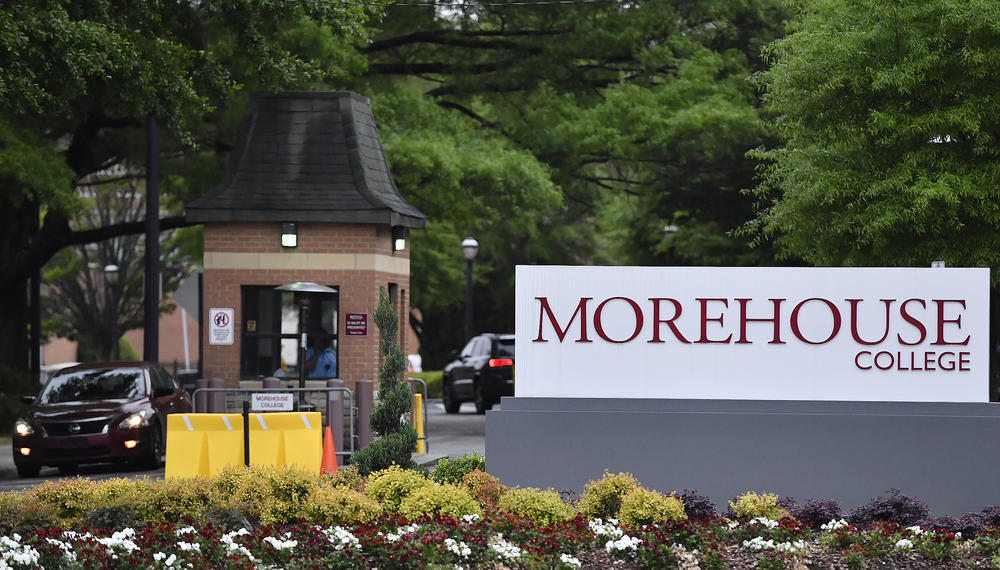
Section Branding
Header Content
Georgia Today: Student still in ICE custody after charges dropped; Voter challenge ruling appealed
Primary Content
On the Tuesday, May 13 edition of Georgia Today: A Georgia college student remains in ICE custody, even though charges against her were dismissed; Morehouse College announces its next president; And a judge hears arguments over whether a conservative-led mass voter challenge intimidated voters of color.

Peter Biello: Welcome to the Georgia Today podcast. Here we bring you the latest reports from the GPB newsroom. On today's episode, a Georgia college student remains in ICE custody even though the charges against her were dismissed. Morehouse College announces its next president. And a judge hears arguments over whether a conservative-led mass voter challenge intimidated voters of color.
Uzoma Nkwanta: Even when those individuals were qualified, those challenges had devastating effects.
Peter Biello: Today is Tuesday, May 13. I'm Peter Biello, and this is Georgia Today.
Story 1:
Peter Biello: Authorities in Northwest Georgia's Dalton have dismissed the traffic charges that led to a 19-year-old Mexican-born college student being arrested and placed in a federal immigration detention facility. The Dalton Police Department said yesterday that one of its officers pulled over the wrong vehicle by mistake. Ximena Arias-Cristobal has been charged with making an improper turn and driving without a license. She remains in custody at an ICE detention center in Southwest Georgia, along with father, who also was arrested for traffic violations. Her supporters say Arias-Cristobal has been in the U.S. since age 4, but did not qualify for DACA protections because the arrival came after a cut-off date to qualify for the program. A social media post by the Department of Homeland Security last Thursday said, quote, "The family will be able to return to Mexico together."

Story 2:
Peter Biello: A federal appeals court in Atlanta is deciding a case involving a mass challenge of Georgia voters in 2021. A lower court had found a conservative group did not violate the Voting Rights Act when it challenged hundreds of thousands of voter registrations. GPB's Sarah Kallis reports.
Sarah Kallis: The case involved a mass voter challenge by the right-leaning group, True the Vote. Plaintiffs, including Fair Fight, founded by Stacey Abrams, argued the voter challenges were intended to intimidate voters and disproportionately impacted voters of color. Fair Fight attorney Uzoma Nkwanta says the lower court ruled erroneously.
Uzoma Nkwanta: Even when those individuals were qualified, those challenges had devastating effect.
Sarah Kallis: Jake Evans, the lawyer for True the Vote, says there is no evidence they intended to intimidate voters and the ruling should be upheld.
Jake Evans: There was an intent to ensure election integrity is maintained, and that's what the intent was.
Sarah Kallis: The court did not rule in the case. For GPB News, I'm Sarah Kallis in Atlanta.
Story 3:
Peter Biello: Gov. Brian Kemp continues signing bills into law, as a deadline tomorrow approaches for him to sign or veto legislation passed in this year's General Assembly. At the state Capitol yesterday, he signed a series of workforce development bills, referencing George's designation as the No. 1 state for business.
Brian Kemp: To us, that is not just a title, it represents real jobs for hardworking Georgians and historic investments coming to literally every part of our state.
Peter Biello: The bills signed yesterday codify into law the college admission program known as Georgia Match, extend the sunset date on the college completion grant, and create a scholarship for former foster children, among others.
Story 4:
Peter Biello: Three years ago, Augusta resident Christina Guy sued the city housing authority after she was injured during a robbery. She claimed they hadn't taken measures to keep the apartment complex safe. The state Supreme Court heard arguments today in a case that could change the way public housing landlords are held accountable. GPB's Sofi Gratas has more.
Sofi Gratas: The arguments centered around the question of whether housing authorities do or do not fall under the protections of a statute called sovereign immunity, which prevents most state and city agencies from getting sued. Attorney for the Augusta Housing Authority, Christopher Cosper:
Christopher Cosper: This comes from the common law: the king — you can't sue the king, he's a sovereign.
Sofi Gratas: As are agents that do the king's or state's work, he said. While a lower court ruled in favor of that protection, Chief Justice Nels Peterson on Tuesday called the case, quote, "challenging." Several other lawsuits where tenants allege harm from conditions in public housing, including some out of the same complex where Christina Guy was injured, are on pause until the higher court reaches a decision, which could take months. For GPB News, I'm Sofi Gratas.

Story 5:
Peter Biello: Atlanta's Morehouse College has named a public health leader as its next president. The historically Black college says Dubois Bowman will lead the college, and its more than 2,000 students, beginning in July. Bowman is a 1992 Morehouse graduate. Bowman currently serves as the dean of the University of Michigan School of Public Health. He'll succeed David Thomas, who became president in 2018 and announced his retirement plans last year. His tenure comes at a fraught time for historically Black colleges, as President Trump challenges diversity, equity and inclusion policies in higher education.
Story 6:
Peter Biello: In a shortcut between parking lots and classrooms at the University of Georgia, a transformation is taking place. A garden for medicinal plants from the Caribbean, Mexico, and South and Central America is now home to the Three Sisters. This symbiotic planting of squash, beans, and corn fed people in the Southeast U.S. for centuries before European contact. WUGA's Emma Auer has more on what adding the Three Sisters to the garden means for UGA scholars and Indigenous students.
Emma Auer: Campus buses roar past as Justice Britain stops to admire over half a dozen mounds of earth, each one about 6 inches tall, in a stone bed with pink flowers climbing its sides in the center of UGA's Ethno-Botanical Garden of the Americas. Back in mid-April, Britain, working on a Ph.D. In anthropology, led students in planting these mounds.
Justice Britain: I tried to instruct the students to look at it like a caldera, like a volcano. You're going to plant the corn on the peak and then the beans get planted on the slope. So, halfway between where the squash is planted on outside of the mound and where the corn is planted at the top.
Emma Auer: Together, those three plants, corn, beans, and squash, are what's known among many Native American cultures as the Three Sisters. Britain learned the Three Sisters planting method from his family. He has Cherokee and Choctaw heritage, two of the Native American tribes that have long lived in the Southeast. This is the third year that Britain has planted the Three Sisters at UGA with the support of the Institute for Native American Studies, where Dr. James Owen is the assistant director.
Dr. James Owen: Working in the Southeast in Native American Studies, Three Sisters agriculture is the thing. I mean, it's one of the most sustainable agricultural systems in the world.
Emma Auer: That's because of how the plants all give each other something they need, but can't provide themselves.
Dr. James Owen: The corn grows really sturdy, tall stalks, but it also sort of depletes the soil of nitrogen.
Emma Auer: When you fertilize your plants, you're giving them nitrogen.
Dr. James Owen: Beans need a structure to grow on like corn stalks, but they replenish the soil with nitrogen.
Emma Auer: So beans fertilize the corn. The corn gives the beans a pull to climb and the big squash leaves do their part by sort of trapping moisture in the soil like a greenhouse. Owen says that the Three Sisters may be new to the UGA campus, but they're certainly not new to Georgia.
Dr. James Owen: It's been something that's been happening here for over 800 years, so there's a lot of evidence to suggest that the Southeast was really one of the most densely populated parts of the world in 1492. And that's because of the Three Sisters and similar agricultural and ecological practices.
Emma Auer: The Ethno-Botanical Garden of the Americas was built in 1998 to foster appreciation for plants from Latin America, but the focus of the garden has gradually expanded. Nunnally Benzing started as the garden's curator four years ago.
Nunnally Benzing: At that time, the garden was kind of in flux coming out of the pandemic and it was struggling.
Emma Auer: Her focus has been incorporating more North American plants to support insects like bees and give Indigenous students space to see their cultures represented. Justice Britton says he's excited that the garden is highlighting the agricultural heritage that continues to sustain Native communities.
Justice Britain: The idea that Native students are finally getting a place to nurture and to create spaces to provide that knowledge and to work together and to experience the culture is just a special opportunity.
Emma Auer: Britain and Benzing aren't sure what challenges the garden will face this growing season, but they're certain they'll have something to harvest in a few weeks' time. For WUGA News, I'm Emma Auer.
Story 7:
Peter Biello: Georgia is adding six more locations to its register of historic places. The State Department of Community Affairs announced the additions today prior to their submissions to the National Park Service and its National Register of Historic Places. They include the downtown Albany Commercial Historic District, noted for its place as the historic center for economic commerce in Southwest Georgia; the Banning Mills Industrial-Archeological District in West Georgia's Carroll County; a former mill site noted for innovations in the pulp and paper industry; and the Railroad Street Historic District in Metro Atlanta's Fayetteville, noted as one of the most intact collection of historic houses in Fayette County. The designations are aimed at fostering historic preservation through public awareness.

Story 8:
Peter Biello: In sports, the Braves hoped to even their record to .500 with a win tonight against the Washington Nationals. Last night, Alex Verdugo's single in the ninth inning drove in the winning run as the Braves beat the Nationals 4-3. The Nationals have now lost six in a row. Marcel Ozuna drove in two runs with two hits, including a 464-foot homer off Jake Irvin in the fifth. Also worth noting, Atlanta first baseman Matt Olson played his 661st consecutive game, the Majors' longest active streak, which began on May 2, 2021. And the Braves have added another sweetener to their schedule to get fans to Truist Park: a bobblehead paying tribute to Atlanta musician Usher. The announcement comes a day after Usher received an honorary doctorate at Emory University's commencement. The first 15,000 fans will get their hands on the bobblehead, which features the Peace Up A-Town hand gesture. The Braves had had success drawing on Atlanta's roster of musicians, having offered fans OutKast and Ludacris bobbleheads in recent years.
That's it for this edition of Georgia Today, but there's more to come tomorrow, so make sure you subscribe and check out GPB.org/news for updates on any of the stories you heard today. If you've got feedback, send it our way by email. The address is GeorgiaToday@GPB.org. I'm Peter Biello. Thanks again for listening. We'll see you tomorrow.
---
For more on these stories and more, go to GPB.org/news



